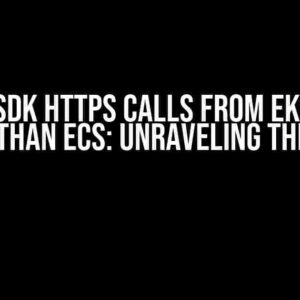Are you struggling to access environment variables in your Azure Function, despite defining them in the Startup class? You’re not alone! Many developers face this issue, and it’s more common than you think. In this article, we’ll dive into the world of Azure Functions, environment variables, and the Startup class to uncover the reasons behind this problem and provide you with actionable solutions.
The Problem: Environment Variables in Azure Functions
Azure Functions provide an excellent way to run small code snippets in a serverless environment. One of the essential aspects of developing Azure Functions is configuring environment variables. These variables allow you to store sensitive information, such as API keys, connection strings, or other configuration settings, without hardcoding them into your code.
However, when you define environment variables in the Startup class, your Azure Function might not be able to read them. This can lead to frustrating errors and unexpected behavior. So, what’s going on?
Understanding the Startup Class in Azure Functions
In Azure Functions, the Startup class is a special class that allows you to configure and initialize your function app. This class is responsible for setting up the Dependency Injection (DI) container, configuring services, and performing other initialization tasks.
The Startup class is typically used to define environment variables, middleware, and other configurations that are shared across your function app. However, when you define environment variables in the Startup class, they might not be accessible to your Azure Function.
Reasons Why Your Azure Function Cannot Read Environment Variables
There are several reasons why your Azure Function might not be able to read environment variables defined in the Startup class. Let’s explore the most common causes:
- Scope Issues: Environment variables defined in the Startup class are only accessible within the scope of the Startup class. If you try to access these variables in your Azure Function, they might not be available.
- DI Container Limitations: The DI container in Azure Functions has limitations when it comes to resolving environment variables. If you’re using the DI container to inject environment variables, you might encounter issues.
- Configuration Settings: Azure Functions have their own configuration settings, which can override environment variables defined in the Startup class. If you’re using configuration settings, they might take precedence over environment variables.
- Function App Configuration: The function app configuration can also affect the accessibility of environment variables. If you’re using a function app configuration file (e.g., host.json), it might override environment variables defined in the Startup class.
Solutions to Access Environment Variables in Azure Functions
Now that we’ve identified the potential causes, let’s explore the solutions to access environment variables in Azure Functions:
1. Use the Environment Variable in the Azure Function Code
Instead of defining environment variables in the Startup class, you can use the Environment class to set and retrieve environment variables directly in your Azure Function code.
using Microsoft.Azure.Functions.Worker;
using Microsoft.Extensions.Logging;
public static void Run(
[TimerTrigger("0 */5 * * * *")] TimerInfo myTimer,
ILogger logger,
Environment environment)
{
string myEnvironmentVariable = environment.GetEnvironmentVariable("MY_ENV_VAR");
logger.LogInformation($"Environment Variable: {myEnvironmentVariable}");
}2. Use the IConfiguration Interface
Azure Functions provide the IConfiguration interface to access configuration settings, including environment variables. You can inject the IConfiguration instance into your Azure Function to retrieve environment variables.
using Microsoft.Azure.Functions.Worker;
using Microsoft.Extensions.Configuration;
using Microsoft.Extensions.Logging;
public static void Run(
[TimerTrigger("0 */5 * * * *")] TimerInfo myTimer,
ILogger logger,
IConfiguration configuration)
{
string myEnvironmentVariable = configuration["MY_ENV_VAR"];
logger.LogInformation($"Environment Variable: {myEnvironmentVariable}");
}3. Use the Dependency Injection Container
If you’re using the Dependency Injection (DI) container in your Azure Function, you can register the environment variables as services and inject them into your Azure Function.
using Microsoft.Azure.Functions.Worker;
using Microsoft.Extensions.DependencyInjection;
using Microsoft.Extensions.Logging;
public static void Run(
[TimerTrigger("0 */5 * * * *")] TimerInfo myTimer,
ILogger logger,
IServiceProvider serviceProvider)
{
var environmentVariableService = serviceProvider.GetService();
string myEnvironmentVariable = environmentVariableService.GetEnvironmentVariable("MY_ENV_VAR");
logger.LogInformation($"Environment Variable: {myEnvironmentVariable}");
} 4. Use the Function App Configuration File
Azure Functions provide a function app configuration file (host.json) that allows you to define environment variables and other configuration settings. You can use this file to define environment variables that are accessible to your Azure Function.
{
"version": "2.0",
"environmentVariables": {
"MY_ENV_VAR": "My Environment Variable Value"
}
}Best Practices for Using Environment Variables in Azure Functions
When working with environment variables in Azure Functions, follow these best practices:
- Use the
Environmentclass orIConfigurationinterface to access environment variables. - Avoid hardcoding environment variables in your code.
- Use the function app configuration file (host.json) to define environment variables.
- Keep environment variables secure by using Azure Key Vault or other secure storage solutions.
- Test your environment variables in local development and production environments.
Conclusion
In conclusion, accessing environment variables in Azure Functions can be a challenge, but by understanding the Startup class, Dependency Injection container, and configuration settings, you can overcome these issues. By following the solutions and best practices outlined in this article, you’ll be able to successfully read and use environment variables in your Azure Functions.
Remember, environment variables are essential for configuring and securing your Azure Functions. By using them effectively, you can create scalable, maintainable, and secure serverless applications.
| Keyword | Explanation |
|---|---|
| Azure Functions | A serverless computing service that allows you to run code snippets in a cloud environment. |
| Environment Variables | Variables that store sensitive information, such as API keys, connection strings, or other configuration settings. |
| Startup Class | A special class in Azure Functions that allows you to configure and initialize your function app. |
| Dependency Injection (DI) Container | A mechanism that allows you to manage dependencies and services in your Azure Function. |
| IConfiguration Interface | An interface that provides access to configuration settings, including environment variables. |
If you’re still struggling to access environment variables in your Azure Function, feel free to ask in the comments below, and we’ll do our best to help you out!
Frequently Asked Question
Azure Functions can be finicky, and sometimes, they just won’t play nice with environment variables defined in the Startup class. But don’t worry, we’ve got you covered!
Why can’t my Azure Function read the environment variable defined in the Startup class?
The most common reason is that the environment variable is not being set correctly or not being set at the correct scope. Environment variables set in the Startup class are only available within the context of that class, not globally. Make sure you’re setting the variable at the correct scope and that it’s being set before the Azure Function is executed.
How do I set environment variables in the Startup class correctly?
In the Startup class, you can set environment variables using the `IWebHostBuilder` interface. For example, `webBuilder.UseEnvironment(“Development”);` or `webBuilder.UseSetting(“MY_VAR”, “my_value”);`. You can also use the `IConfiguration` interface to set environment variables from a configuration file.
What is the correct scope for setting environment variables in an Azure Function?
The correct scope for setting environment variables in an Azure Function is at the Function App level. You can set environment variables in the Azure portal, under the “Configuration” section of your Function App. Alternatively, you can set environment variables in the host.json file or in the local.settings.json file.
How do I access environment variables in my Azure Function code?
You can access environment variables in your Azure Function code using the `System.Environment` class. For example, `string myVar = Environment.GetEnvironmentVariable(“MY_VAR”);`. Make sure to check if the variable is null before using it, as it may not be set in all environments.
What are some common troubleshooting steps for environment variable issues in Azure Functions?
Some common troubleshooting steps include checking the Azure portal logs for errors, verifying that the environment variable is set correctly, checking the Function App configuration, and testing the Azure Function locally using the Azure Functions Core Tools.



